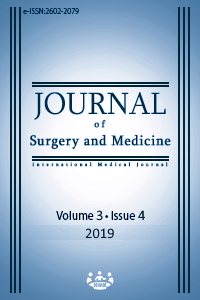Is there any association between childhood trauma and chronic dermatological diseases? A case-control study
Keywords:
depression, anxiety, childhood traumaAbstract
Aim: It is known that traumatic experiences in childhood cause many psychosomatic and psychodermatological diseases. Common dermatological diseases bring abaout not only dermatological but also psychosocial problems. In our study, we aimed to investigate association of depression, anxiety and childhood trauma with chronic dermatological diseases.
Methods: After power analysis, 76 patients with chronic dermatological diseases (study group) and 75 healthy volunteers (control group) were included in this study. Beck Anxiety Inventory, Beck Depression Inventory and Childhood Trauma Scale (CTQ 28) were administered to these individuals.
Results: The anxiety (p=0.001) and depression (p<0.001) levels were higher in the study group than control group. However, there was no difference with CTQ 28 total (p=0.217) and subscales scores (p=0.159, p=0.976, p=0.902, p=0.234 and p=0.267, respectively) between groups. Physical neglect scores differed significantly according to educational status in the patient group (F=3.643, p=0.031). Emotional neglect and total CTQ 28 scores were higher in patients with lichen simplex chronicus (p=0.234).
Conclusion: In our study, unlike previous studies, dermatological diseases such as lichen planus, Behçet’s disease, choronic urticaria, vitiligo were included in the study. These group of diseases should be considered because they adversely affect every aspect of patients' lives in almost. Patients should be carefully evaluated for psychiatric support. We think that the detailed investigation of traumatic experiences from both dermatologists and psychiatrists can lead to better results in the treatment of chronic patients by using psychotherapeutic interventions.
Downloads
References
Özcan Ö, Karlıdağ R. Necessity of Dermatologist and Psychiatrist Collaboration. Turkiye Klinikleri J Dermatol-Special Topics. 2009;2(4):11-5.
Gupta MA, Gupta AK. Psychodermatology: an update. J Am Acad Dermatol. 1996;34:1030-1046.
Sivik T, Schoenfeld R. Psychosomatology as a theoretical paradigm of modern psychosomatic medicine. International Congress Series. 2006;1287:23-8.
Panconesi E. Psychosomatic dermatology: past and future. International Journal of Dermatology. 2000;39:732-4.
Altunay Kıvanç İ. The Future of Psychodermatology. Türkderm. 2010;44(1):55-6.
Adışen E, Önder M. Psychogenic dermatoses. Turkiye Klinikleri J Int Med Sci. 2006;2(48):51-7.
Altunay Kıvanç İ. Stress and Skin. Turkiye Klinikleri J Dermatol-Special Topics. 2009;2(4):16-23.
Ghupta MA, Ghupta AK. The use of antidepressant drugs in dermatology. J Eur Acad Dermatol Venereol. 2001;15(6):512-8.
Russo PA, Ilchef R, Cooper AJ. Psychiatric morbidity in psoriasis: a rewiev. Australas J Dermatol. 2004;45(3):155-61.
Dauvermann MR, Donohoe G. The role of childhood trauma in cognitive performance in schizophrenia and bipolar disorder – A systematic review. Schizophrenia Research: Cognition. 2019;6:1–11.
Yalçın M, Tellioğlu E, Yıldırım DU, Savrun BM, Özmen M, Aydemir EH. Psychiatric Features in Neurotic Excoriation Patients: The Role of Childhood Trauma. Arch Neuropsychiatr. 2015;52:336-41.
Şar V, Ozturk E, İkikardeş E. Cocukluk Cağı Ruhsal Travma Ölceğinin Türkçe uyarlamasının geçerlilik ve güvenilirliği. Türkiye Klinikleri J Med Sci. 2012;32:1054-63.
Beck AT, Ward CH, Mendelson M, Mock J, Erbaugh J. An inventory for measuring depression. Arch Gen Psychiatry. 1961;4:561-71.
Hisli N. Beck Depresyon Envanterinin üniversite öğrencileri için geçerliliği ve güvenirliği. Psikoloji Dergisi. 1989;7:3-13.
Beck AT, Steer RA. Beck Anxiety Inventory Manual. Psychological Corporation, San Antonio, TX, 1990.
Woodruff PW, Higgins EM, Du Vivier AW, Wessely S. Psychiatric illness in patients referred to a dermatology psychiatry clinic. Gen Hosp Psychiatry. 1997;19:29-35.
Snorrason I, Belleau EL, Woods DW. How related are hair pulling disorder (trichotillomania) and skin picking disorder? A review of evidence for comorbidity, similarities and shared etiology. Clin Psychol Rev. 2012;32:618-29.
Misery L, Chastaing M, Touboul S, Callot V, Schollhammer M, Young P, et al. Psychogenic skin excoriations: diagnostic criteria, semiological analysis and psychiatric profiles. Acta Derm Venereol. 2012;92:416-8.
Ozturk MO, Uluşahin A. Ruh Sağlığı ve Bozuklukları, 11. Basım. Ankara: Nobel Tıp Kitabevleri; 2008.
Teicher MH, Andersen SL, Polcari A, Anderson CM, Navalta CP. Developmental neurobiology of childhood stress and trauma. Psychiatr Clin North Am. 2002;25:397-426.
Willemsen R, Vanderlinden J, Roseeuw D, Haentjens P. Increased history of childhood and lifetime traumatic events among adults with alopecia areata. J Am Acad Dermatol. 2009;60:388-93.
Sesliokuyucu C, Şahpolat M, Arı M. Psöriazisli Hastaların Depresyon, Anksiyete, Çocukluk Çağı Ruhsal Travması ve Yaşam Kalitesi ile Sosyodemografik Özelliklerinin Araştırılması. Journal of Mood Disorders (JMOOD). 2017;7(1):28-40.
Gupta MA, Lanius Ruth A, Bessel A, Van der Kolk B. Psychologic trauma, posttraumatic stress disorder and dermatology. Dermatol Clin. 2005;23:649-56.
Van der Kolk BA, Perry JC, Herman JL. Childhood origins of self-destructive behavior. Am J Psychiatry. 1991;148:166-71.
Downloads
- 1288 1644
Published
Issue
Section
How to Cite
License
Copyright (c) 2019 Zeynep Gizem Kaya İslamoğlu, Gözde Ulutaş Demirbaş, Mehmet Unal, Memduha Aydın
This work is licensed under a Creative Commons Attribution-NonCommercial-NoDerivatives 4.0 International License.
















